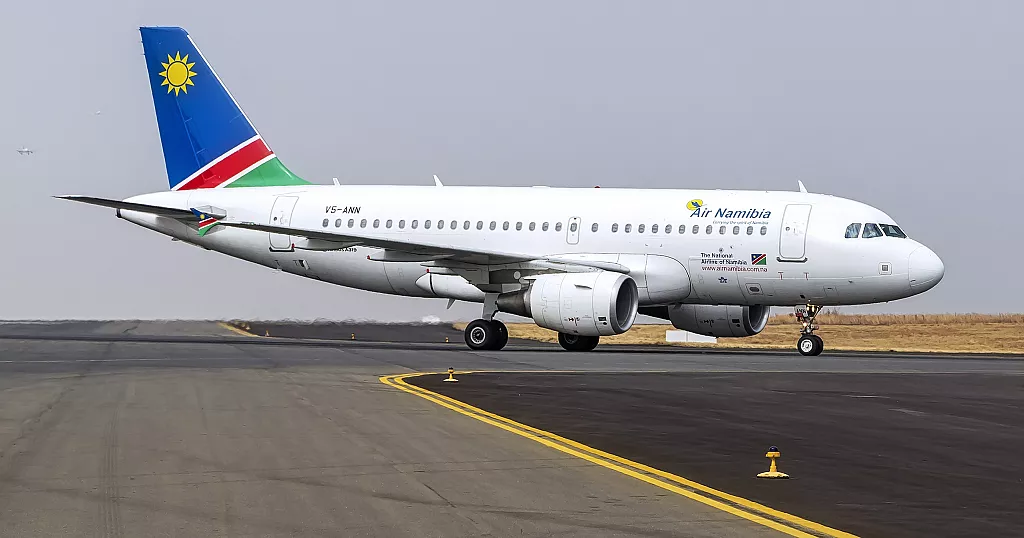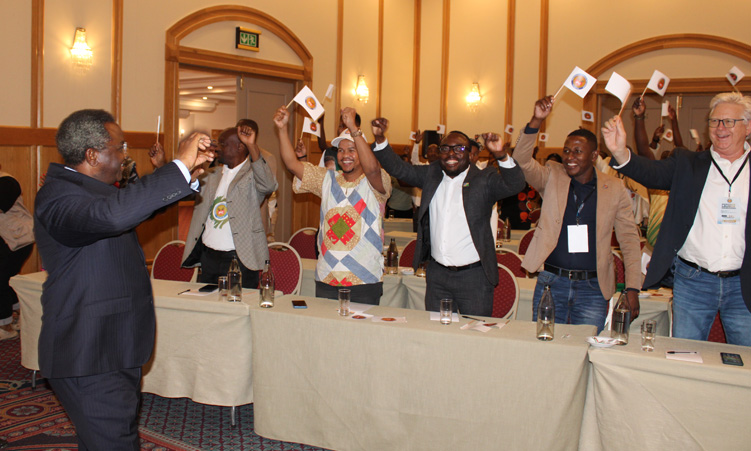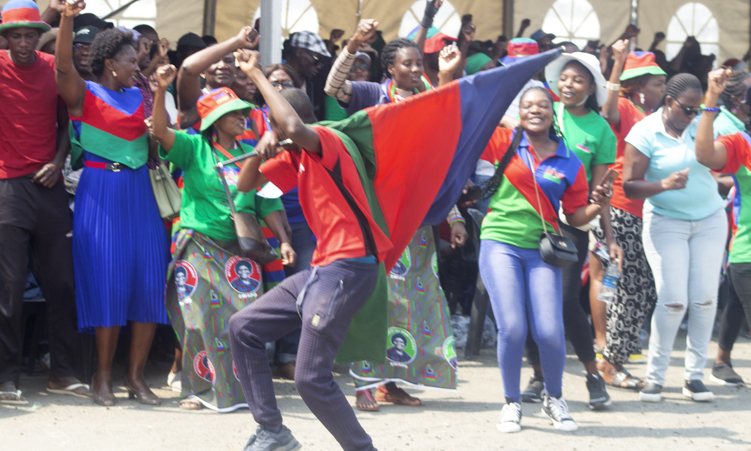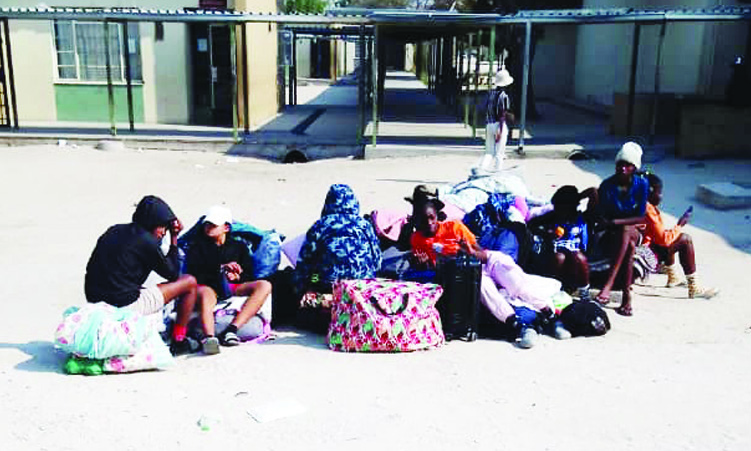PERTH-BASED Russian mining entrepreneur Vladimir Nikolaenko has gained effective control of the board of Australian uranium exploration junior West Australian Metals (WME) – which has just announced a trebling of the contained uranium resource at its Marenica uranium deposit 60 km north of the Roessing mine.
Resolutions proposed by three shareholding companies in West Australian Metals (WME) controlled by mining entrepreneur Vladimir Nikolaenko were adopted with large majorities at the August 4 shareholders’ general meeting in Perth. The outcome means that Nikolaenko has gained effective control of WME as the three new directors appointed by the meeting hold a majority on the enlarged five-person board.The resolutions appointing the three new directors and two other resolutions were passed by proxy votes on a show of hands at the meeting: Gary Stokes, Magna Mining chief executive officer received 100,8 million for to 30,3 million against); David Sanders, an attorney whose firm is understood to act for Nikolaenko’s companies (122,5 million for, 13,1 million against); Kevin Judge, an accountant (ditto).The resolution removing Terence Shanahan as one of the three existing directors was approved by 100,8 million to 30,3 million proxy votes.Finally, a resolution to change the company’s name to West African Metals, put forward by the existing WME board, was defeated by 105,5 million to 11,9 million proxy votes.Two of the existing directors, chairman Rodger Johnston and technical director and acting chief executive officer Leon Reisgys, currently remain on the board.It would appear from the voting that Nikolaenko owned much more of WME’s stock than the approximately six per cent held by the three “requisitioning parties” for the meeting – his companies, Kaliara Nominees, Mallee Minerals and Vargas Holdings.The existing WME board had notified the Company Announcements Office of the Australian Stock Exchange (ASX) on July 25 that it had become aware of a letter (July 21) sent to shareholders by the three “requisitioning parties”, which contained instructions on how to vote, and in its own letter to shareholders of July 29 it recommended they should “disregard and take no action” in respect of the Nikoalenko letter.The July 29 letter added that while Nikolaenko had claimed his companies were not seeking to take control of WME, the existing board was “very concerned” by claims attributed to him that he may control in excess of the takeover threshold of 20 per cent of the voting shares.The letter also quoted an (unidentified) German investment newsletter as claiming, following an interview with Nikolaenko, that the Russian might in fact control over 40 per cent of the voting shares.WME had written to Nikolaenko’s lawyers seeking a confirmation or denial of this claim, but had not received a reply.In a further bid to head off the Nikolaenko bid for effective board control, Johnston had unsuccessfully sought a court order to postpone the August 4 meeting by a few days to provide more time for shareholders to become fully informed about the resolutions to be voted on.Nikolaenko’s subsequent success could have adverse implications for further progress with the Marenica project, as the current exploration licence comes up for renewal at the end of this year.Although in mid-July Nikolaenko resigned as a director of Magna Mining – after many years on the board – that company’s current involvement in a lawsuit against the Ministry of Mines and Energy could prove problematic.ABOUT STOKES Although following The Namibian’s previous article, Stokes had requested that we correct the impression that Magna was connected with the court case, in fact this is demonstrated by that company’s own announcement of March 7 to the Company Announcements Office of the Australian Stock Exchange (ASX).The statement, issued by Magna’s Company Secretary David Semmens, said that locally-registered firm, Erongo Nuclear Exploration, had instituted proceedings in Namibia’s High Court against the Ministry over the latter’s refusal to award it exclusive exploration licences (EPLs) for nuclear fuels.It added that Erongo “is fully owned by a joint venture company in which Magna Mining has the right to acquire (a) shareholding”, and further that the disputed EPLs cover an area over which “Magna’s wholly owned subsidiary Black Range Mining (Pty) Ltd” holds existing EPLs for other minerals.”The statement named Erongo and Black Range as “first and second applicants” respectively in the lawsuit, meaning that even if Magna has not subsequently acquired a shareholding interest in Erongo, its wholly owned subsidiary Black Range Mining is a party to the legal proceedings.The August 4 board vote came only days after WME had announced a resource upgrade for its Marenica uranium project 60 km north of the Roessing mine in west-central Namibia, trebling the inferred resource estimate to 34 million pounds (15 400 tonnes) of U3O8.REISGYS STAYS IN CHARGE Investors in West Australian Metals (WME) can draw some comfort from the fact that Leon Reisgys will continue to direct the company’s successful exploration programme at its flagship Marenica project despite the recent enforced board changes.According to an August 6 notification to the ASX, Reisgys has relinquished his role as acting chief executive officer (CEO) but “continues as technical director”.WME’s former chairman Rodger Johnston also remains on the board as a non-executive director.Gary Stokes has taken over as both WME managing director and CEO and, assuming “day-to-day” responsibility for the company’s management.He was previously CEO of fellow Australian junior explorer Magna Mining but resigned the same day as his WME appointment took effect.According to the announcement, Stokes will bring “a wealth of experience in mining projects” and “a strong commercial focus” to WME although apart from Magna his main experience has been governmental, as a former senior manager responsible for state agreements on mining operations for Western Australia’s Department of Industry and Resources.Stokes is receiving a A$280 000 ($260 000) annual remuneration package- Reisgys gets A$250 000 ($233 000) annually under a three-year contract from mid-2006.Subject to shareholder approval at WME’s next annual general meeting – due in the 2008 fourth quarter – Stokes will receive 5 million incentive options under a share price appreciation incentives arrangement once pre-determined share price performance criteria are met.WME’s share price has recovered some ground since the board changes were announced on August 4, trading at A$0,175 ($0.163) per share as of August 7, slightly up from A$0,17 ($0.16) per share on August 5.The outcome means that Nikolaenko has gained effective control of WME as the three new directors appointed by the meeting hold a majority on the enlarged five-person board.The resolutions appointing the three new directors and two other resolutions were passed by proxy votes on a show of hands at the meeting: Gary Stokes, Magna Mining chief executive officer received 100,8 million for to 30,3 million against); David Sanders, an attorney whose firm is understood to act for Nikolaenko’s companies (122,5 million for, 13,1 million against); Kevin Judge, an accountant (ditto).The resolution removing Terence Shanahan as one of the three existing directors was approved by 100,8 million to 30,3 million proxy votes.Finally, a resolution to change the company’s name to West African Metals, put forward by the existing WME board, was defeated by 105,5 million to 11,9 million proxy votes.Two of the existing directors, chairman Rodger Johnston and technical director and acting chief executive officer Leon Reisgys, currently remain on the board.It would appear from the voting that Nikolaenko owned much more of WME’s stock than the approximately six per cent held by the three “requisitioning parties” for the meeting – his companies, Kaliara Nominees, Mallee Minerals and Vargas Holdings.The existing WME board had notified the Company Announcements Office of the Australian Stock Exchange (ASX) on July 25 that it had become aware of a letter (July 21) sent to shareholders by the three “requisitioning parties”, which contained instructions on how to vote, and in its own letter to shareholders of July 29 it recommended they should “disregard and take no action” in respect of the Nikoalenko letter.The July 29 letter added that while Nikolaenko had claimed his companies were not seeking to take control of WME, the existing board was “very concerned” by claims attributed to him that he may control in excess of the takeover threshold of 20 per cent of the voting shares.The letter also quoted an (unidentified) German investment newsletter as claiming, following an interview with Nikolaenko, that the Russian might in fact control over 40 per cent of the voting shares.WME had written to Nikolaenko’s lawyers seeking a confirmation or denial of this claim, but had not received a reply.In a further bid to head off the Nikolaenko bid for effective board control, Johnston had unsuccessfully sought a court order to postpone the August 4 meeting by a few days to provide more time for shareholders to become fully informed about the resolutions to be voted on.Nikolaenko’s subsequent success could have adverse implications for further progress with the Marenica project, as the current exploration licence comes up for renewal at the end of this year.Although in mid-July Nikolaenko resigned as a director of Magna Mining – after many years on the board – that company’s current involvement in a lawsuit against the Ministry of Mines and Energy could prove problematic. ABOUT STOKES Although following The Namibian’s previous article, Stokes had requested that we correct the impression that Magna was connected with the court case, in fact this is demonstrated by that company’s own announcement of March 7 to the Company Announcements Office of the Australian Stock Exchange (ASX).The statement, issued by Magna’s Company Secretary David Semmens, said that locally-registered firm, Erongo Nuclear Exploration, had instituted proceedings in Namibia’s High Court against the Ministry over the latter’s refusal to award it exclusive exploration licences (EPLs) for nuclear fuels.It added that Erongo “is fully owned by a joint venture company in which Magna Mining has the right to acquire (a) shareholding”, and further that the disputed EPLs cover an area over which “Magna’s wholly owned subsidiary Black Range Mining (Pty) Ltd” holds existing EPLs for other minerals.”The statement named Erongo and Black Range as “first and second applicants” respectively in the lawsuit, meaning that even if Magna has not subsequently acquired a shareholding interest in Erongo, its wholly owned subsidiary Black Range Mining is a party to the legal proceedings.The August 4 board vote came only days after WME had announced a resource upgrade for its Marenica uranium project 60 km north of the Roessing mine in west-central Namibia, trebling the inferred resource estimate to 34 million pounds (15 400 tonnes) of U3O8.REISGYS STAYS IN CHARGE Investors in West Australian Metals (WME) can draw some comfort from the fact that Leon Reisgys will continue to direct the company’s successful exploration programme at its flagship Marenica project despite the recent enforced board changes.According to an August 6 notification to the ASX, Reisgys has relinquished his role as acting chief executive officer (CEO) but “continues as technical director”.WME’s former chairman Rodger Johnston also remains on the board as a non-executive director.Gary Stokes has taken over as both WME managing director and CEO and, assuming “day-to-day” responsibility for the company’s management.He was previously CEO of fellow Australian junior explorer Magna Mining but resigned the same day as his WME appointment took effect.According to the announcement, Stokes will bring “a wealth of experience in mining projects” and “a strong commercial focus” to WME although apart from Magna his main experience has been governmental, as a former senior manager responsible for state agreements on mining operations for Western Australia’s Department of Industry and Resources.Stokes is receiving a A$280 000 ($260 000) annual remuneration package- Reisgys gets A$250 000 ($233 000) annually under a three-year contract from mid-2006.Subject to shareholder approval at WME’s next annual general meeting – due in the 2008 fourth quarter – Stokes will receive 5 million incentive options under a share price appreciation incentives arrangement once pre-determined share price performance criteria are met.WME’s share price has recovered some ground since the board changes were announced on August 4, trading at A$0,175 ($0.163) per share as of August 7, slightly up from A$0,17 ($0.16) per share on August 5.
Stay informed with The Namibian – your source for credible journalism. Get in-depth reporting and opinions for
only N$85 a month. Invest in journalism, invest in democracy –
Subscribe Now!






